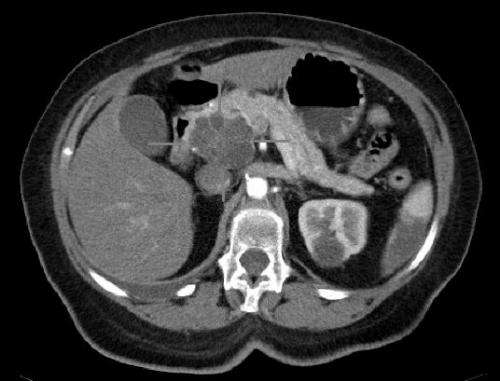Pancreatic cancer projected to become second leading cause of cancer-related death in the US by 2030

(Medical Xpress)—An analysis projects pancreatic and liver cancers to become second and third leading causes of cancer-related death in the United States by 2030, respectively, behind lung cancer, which will remain the number one killer, according to data published in Cancer Research, a journal of the American Association for Cancer Research.
According to the projections by the Pancreatic Cancer Action Network in Manhattan Beach, Calif., which conducted the research, breast, prostate, and lung cancers will remain the top three cancer diagnoses in 2030. Colorectal cancer, which is currently the fourth leading cancer diagnosis, will be replaced by thyroid cancer, followed by melanoma and uterine cancers in fifth and sixth places, respectively. Lung cancer will remain the top killer, but pancreatic and liver cancers are projected to surpass breast, prostate, and colorectal cancers to become the second and third leading causes of cancer death, respectively.
"The projections for deaths from pancreatic and liver cancers are startling," said Lynn Matrisian, Ph.D., MBA, vice president of scientific and medical affairs at the Pancreatic Cancer Action Network. "This study is a call to action to the scientific and clinical communities, as well as the population at large, to increase attention, awareness, and ultimately progress in the fight against pancreatic cancer."
The researchers estimated the cancer incidence and death rates by taking into account two important factors: The first is changes in demographics, caused by an increase in the number of aging baby boomers and increase in minority populations, some of whom have higher rates of cancer incidence and death. The second factor is changes in the average annual percentage of cancer incidence and deaths, influenced by factors such as better screening and prevention methods, and prevalence of smoking and viral infections.
The projected decrease in colorectal cancer incidence is attributed to advances in screening and the projected increase in thyroid cancer incidence is a consequence of increased diagnosis, which is not accompanied by an increase in deaths, explained Matrisian.
"Overall, it is encouraging that the cancer death rate in the United States is declining each year, and the numbers of deaths caused by several major cancers are following that trend and dropping," said Matrisian. "The scientific and clinical research communities must bring successes from other cancer types to bear on tackling pancreatic and liver cancers and improving outcomes for patients."
Historically, pancreatic cancer is a disease that is understudied and underfunded, explained Matrisian. The pancreas is located deep within the abdomen and is difficult to access and visualize by imaging modalities. In addition, pancreatic tumors are surrounded and infiltrated by dense stromal tissue that is thought to impede drug delivery. This is further complicated by data suggesting pancreatic tumors metastasize early in the disease course.
"The Pancreatic Cancer Action Network has a comprehensive approach to fighting this disease through research, patient support, community outreach, and advocacy for a cure," Matrisian added. "In an effort to double pancreatic cancer survival by 2020, the network is intensifying efforts to heighten awareness, raise funds for comprehensive private research, and advocate for dedicated federal research to advance early diagnostics, better treatments, and increase chances of survival."












